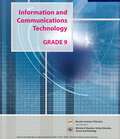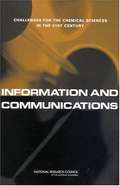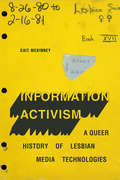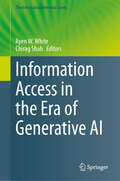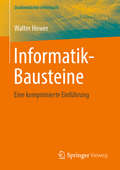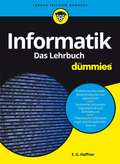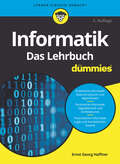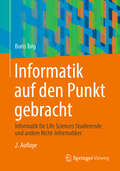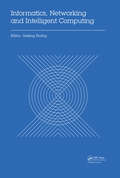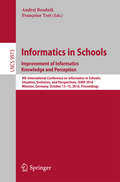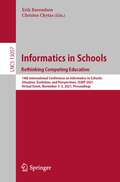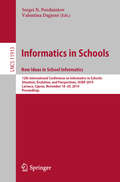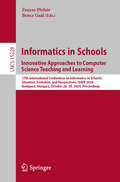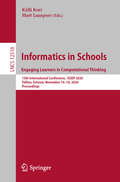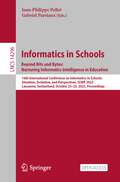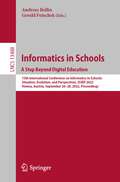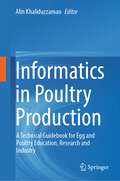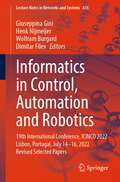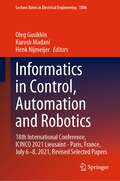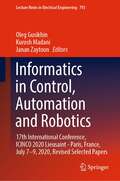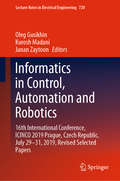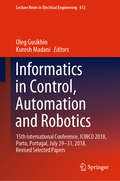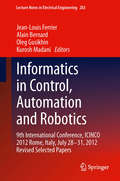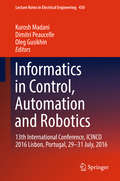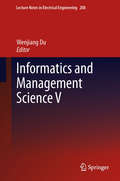- Table View
- List View
Information And Communications Technology class 9 - MIE
by Mauritius Institute of EducationThe Grade 9 ICT workbook is meticulously crafted to align with the National Curriculum Framework, recognizing the pivotal role of digital literacy in today's evolving landscape. With a strategic focus on technology's exponential growth, the workbook unfolds across nine comprehensive units, ranging from fundamental computer operations to practical problem-solving and programming. Through a learner-centric approach, the workbook amalgamates theoretical concepts with engaging practical activities, employing games, and exercises that foster hands-on learning experiences. Emphasizing continuous engagement, it encourages a year-long blend of theory and application. Symbolized guides like Tipiyu, carried over from previous grades, enrich the learning journey, while colored elements and symbols serve as aids, enhancing comprehension. Anchored in promoting ICT skills essential for a burgeoning knowledge society, this workbook primes students for the National Examination, nurturing their capacity to navigate digital environments, solve problems, and flourish in an increasingly tech-driven world.
Information And Communications
by Communications Organizing Committee For The Workshop On InformationThis sourcebook is the result of a collective work jointly undertaken by the College of Development Communication of the University of Los Baäos, the Philippines, and FAO Communication for Development Group, in their effort to support collaborative natural resources management in agriculture in Cambodia. This sourcebook is intended to be ready reference material for communication specialists and facilitators organizing training and capability building in communication for development as a strategic component of sustainable natural resource management and rural livelihood initiatives
Information Activism: A Queer History of Lesbian Media Technologies (Sign, Storage, Transmission)
by Cait McKinneyFor decades, lesbian feminists across the United States and Canada have created information to build movements and survive in a world that doesn't want them. In Information Activism Cait McKinney traces how these women developed communication networks, databases, and digital archives that formed the foundation for their work. Often learning on the fly and using everything from index cards to computers, these activists brought people and their visions of justice together to organize, store, and provide access to information. Focusing on the transition from paper to digital-based archival techniques from the 1970s to the present, McKinney shows how media technologies animate the collective and unspectacular labor that sustains social movements, including their antiracist and trans-inclusive endeavors. By bringing sexuality studies to bear on media history, McKinney demonstrates how groups with precarious access to control over information create their own innovative and resourceful techniques for generating and sharing knowledge.
Information Access in the Era of Generative AI (The Information Retrieval Series #51)
by Ryen W. White Chirag ShahGenerative Artificial Intelligence (GenAI) has emerged as a groundbreaking technology that promises to revolutionize many industries as well as people’s personal and professional lives. This book discusses GenAI and its role in information access - often referred to as Generative Information Retrieval (GenIR) - or more broadly, information interaction. The role of GenAI in information access is complex and dynamic, with many dimensions. To address this, following a brief introduction to GenAI and GenIR, the remainder of the book provides eight chapters, each targeting a different dimension or sub-topic. These cover foundations of GenIR, interactions with GenIR systems, adapting them to users, tasks, and scenarios, improving them based on user feedback, GenIR evaluation, the sociotechnical implications of GenAI for information access, recommendations within GenIR, and the future of information access with GenIR. The book is targeted at graduate students and researchers interested in issues of information retrieval, access, and interactions, as well as applications of GenAI in various informational contexts. While some of the parts assume prior background in IR or AI, most others do not, making this book suitable for adoption in various classes as a primary source or as a supplementary material.
Informatik-Bausteine: Eine komprimierte Einführung (Studienbücher Informatik)
by Walter HowerDieses Lehrbuch präsentiert prüfungsrelevantes Basismaterial für Bachelor-Studierende informatiknaher Studiengänge an Hochschulen und Universitäten. Es kombiniert die Themen Diskrete Mathematik, Theoretische Informatik, Algorithmik und Künstliche Intelligenz in einem Band. Die prägnante Form zielt auf eine effiziente Vorbereitung der jeweiligen Prüfung ab; hierzu hilft auch das wohlsortierte Sachwort-Verzeichnis am Ende dieses handlichen Werkes.
Informatik für Dummies, Das Lehrbuch (Für Dummies)
by Ernst Georg HaffnerStudierende von Bachelor-Studiengängen an Hochschulen und Universitäten, bei denen die Informatik auf irgendeine Weise im Curriculum auftaucht, dürfen sich freuen. Dieses Buch verschafft Ihnen - so einfach, schnell und unterhaltsam wie möglich - einen umfassenden Überblick über die praktische, theoretische und technische Informatik. Sie können das Buch ergänzend zur Vorlesung oder zum Selbststudium nutzen. Der Autor kennt die typischen Probleme der Studierenden. Überwinden Sie Ihre Scheu vor Formalismen. Entdecken Sie den Reiz der Computerwissenschaften! Dies ist das perfekte Buch für den Einstieg in die Informatik.
Informatik für Dummies, Das Lehrbuch (Für Dummies)
by Ernst Georg HaffnerSie studieren und müssen sich mit Informatik auseinandersetzen? Dann dürfen Sie sich freuen: Dieses Buch verschafft Ihnen ? so einfach, schnell und unterhaltsam wie möglich ? einen umfassenden Überblick über die praktische, theoretische und technische Informatik. Sie können das Buch ergänzend zur Vorlesung oder zum Selbststudium nutzen. Der Autor kennt die typischen Probleme der Studierenden. Überwinden Sie Ihre Scheu vor Formalismen. Entdecken Sie den Reiz der Computerwissenschaften! Dies ist das perfekte Buch für den Einstieg in die Informatik.
Informatik auf den Punkt gebracht: Informatik für Life Sciences Studierende und andere Nicht-Informatiker
by Boris TolgDieses Lehrbuch richtet sich an Studierende von fachfremden Studiengängen mit Informatikanteilen. Ein besonderer Schwerpunkt liegt dabei auf den sogenannten Lebenswissenschaften, wie Medizintechnik, Rettungsingenieurwesen, Biotechnologie, Umwelttechnik oder Verfahrenstechnik. Das Lehrbuch eignet sich für Leser in Studium und Praxis, die sich einen Einstieg in die Informatik verschaffen wollen. Die Besonderheit dieses Buches liegt in der problembasierten Herangehensweise, sowie der nach verschiedenen Taxonomiestufen konzipierten Übungsaufgaben.
Informatics, Networking and Intelligent Computing: Proceedings of the 2014 International Conference on Informatics, Networking and Intelligent Computing (INIC 2014), 16-17 November 2014, Shenzhen, China
by Jiaxing ZhangThis proceedings volume contains selected papers presented at the 2014 International Conference on Informatics, Networking and Intelligent Computing, held in Shenzhen, China. Contributions cover the latest developments and advances in the field of Informatics, Networking and Intelligent Computing.
Informatics in Schools: Improvement of Informatics Knowledge and Perception
by Andrej Brodnik Françoise TortThis book constitutes the refereed proceedings of the 9th International Conference on Informatics in Schools: Situation, Evolution, and Perspectives, ISSEP 2016, held in M#65533;nster, Germany, in October 2015. The 17 full papers presented together with 1 invited talk were carefully reviewed and selected from 50 submissions. The focus of the conference was on following topics: sustainable education in informatics for pupils of all ages; connecting informatics lessons to the students' everyday lives; teacher education in informatics or computer science; and research on informatics or computer science in schools (empirical/qualitative/quantitative/theory building/research methods/comparative studies/transferability of methods and results from other disciplines).
Informatics in Schools. Rethinking Computing Education: 14th International Conference on Informatics in Schools: Situation, Evolution, and Perspectives, ISSEP 2021, Virtual Event, November 3–5, 2021, Proceedings (Lecture Notes in Computer Science #13057)
by Erik Barendsen Christos ChytasThis book constitutes the proceedings of the 14th International Conference on Informatics in Schools: Situation, Evolution and Perspectives, ISSEP 2021, held in Nijmegen, The Netherlands, in November 2020. Due to COVID-19 related travelling restrictions the conference had to be switched to online format. The 12 full papers presented were carefully reviewed and selected from 29 submissions. They are organized in topical sections named: Fostering Computational Thinking, Programming Education, Advancing Computing Education, and Teachers’ Professional Development.
Informatics in Schools. New Ideas in School Informatics: 12th International Conference on Informatics in Schools: Situation, Evolution, and Perspectives, ISSEP 2019, Larnaca, Cyprus, November 18–20, 2019, Proceedings (Lecture Notes in Computer Science #11913)
by Valentina Dagienė Sergei N. PozdniakovThis book constitutes the proceedings of the 12th International Conference on Informatics in Schools: Situation, Evolution and Perspectives, ISSEP 2019, held in Larnaca, Cyprus, in November 2019. The 23 revised full papers presented were carefully reviewed and selected from 55 submissions. They are organized in topical sections named : teacher education in informatics, primary education in informatics, contemporary computer science ideas in school informatics, teaching informatics: from highschool to university levels, contests, competitions and games in informatics.
Informatics in Schools. Innovative Approaches to Computer Science Teaching and Learning: 17th International Conference on Informatics in Schools: Situation, Evolution, and Perspectives, ISSEP 2024, Budapest, Hungary, October 28–30, 2024, Proceedings (Lecture Notes in Computer Science #15228)
by Zsuzsa Pluhár Bence GaálThis book constitutes the proceedings of the 17th International Conference on Informatics in Schools: Situation, Evolution and Perspectives, ISSEP 2024, held in Budapest, Hungary, during October 28–30, 2024. The 14 full papers presented were carefully reviewed and selected from 42 submissions. The papers cover the following topics: curricula and computer science concepts; problem solving, algorithms and programming; teacher’s perspective.
Informatics in Schools. Engaging Learners in Computational Thinking: 13th International Conference, ISSEP 2020, Tallinn, Estonia, November 16–18, 2020, Proceedings (Lecture Notes in Computer Science #12518)
by Mart Laanpere Külli KoriThis book constitutes the proceedings of the 13th International Conference on Informatics in Schools: Situation, Evolution and Perspectives, ISSEP 2020, held in Tallinn, Estonia, in November 2020. Due to COVID-19 related travelling restrictions the conference had to be switched to online format. The 18 revised full papers presented were carefully reviewed and selected from 53 submissions. They are organized in topical sections named: Tasks for Informatics Competitions; Engagement and Gender Issues in School Informatics; Informatics Teacher Education; Curriculum and Pedagogical Issues.
Informatics in Schools. Beyond Bits and Bytes: 16th International Conference on Informatics in Schools: Situation, Evolution, and Perspectives, ISSEP 2023, Lausanne, Switzerland, October 23–25, 2023, Proceedings (Lecture Notes in Computer Science #14296)
by Jean-Philippe Pellet Gabriel ParriauxThis book constitutes the proceedings of the 16th International Conference on Informatics in Schools: Situation, Evolution and Perspectives, ISSEP 2023, held in Lausanne, Switzerland, during October 23–25, 2023. The 14 full papers presented in this book were carefully reviewed and selected from 47 submissions. They are organized in four topical sections named: artificial intelligence and its applications; competitions, problem solving, and computational; robotics and unplugged modalities; and curricula and computer science concepts. This is an open access book.
Informatics in Schools. A Step Beyond Digital Education: 15th International Conference on Informatics in Schools: Situation, Evolution, and Perspectives, ISSEP 2022, Vienna, Austria, September 26–28, 2022, Proceedings (Lecture Notes in Computer Science #13488)
by Andreas Bollin Gerald FutschekThis book constitutes the proceedings of the 14th International Conference on Informatics in Schools: Situation, Evolution and Perspectives, ISSEP 2021, held in Nijmegen, The Netherlands, in November 2020. Due to COVID-19 related travelling restrictions the conference had to be switched to online format. The 12 full papers presented together with 4 short papers were carefully reviewed and selected from 57 submissions. They are organized in 2 topical sections named: state of research and best practice, country, and experience reports.As in our school education subjects like “digital literacy" or "media literacy" are making their way in, complementing or partially replacing computer science education. The current ISSEP conference reacted to this trend and therefore invited computer scientists, media didactics, and representatives of politics, media and industry to a discussion round on the topic "Media Education or Computer Science? Quo Vadis, School Teaching?".
Informatics in Poultry Production: A Technical Guidebook for Egg and Poultry Education, Research and Industry
by Alin KhaliduzzamanThis book discusses table and hatching eggs, quality-based grading of eggs, pre-incubation, incubation, hatching and post-hatch monitoring period, and how the next-generation management of these process can be enriched by informatics through non-destructive technologies, signal processing, machine learning, AI, IoT applications, etc. This book will be a beneficial resource for egg and poultry science researchers, avian biologists and ecologists, developmental biologists, agricultural engineers, advanced graduate and postgraduate students, and poultry production industry stakeholders.
Informatics in Control, Automation and Robotics: 19th International Conference, ICINCO 2022 Lisbon, Portugal, July 14-16, 2022 Revised Selected Papers (Lecture Notes in Networks and Systems #836)
by Henk Nijmeijer Dimitar Filev Wolfram Burgard Giuseppina GiniThe book focuses the latest endeavors relating researches and developments conducted in fields of control, robotics, and automation. Through ten revised and extended articles, the present book aims to provide the most up-to-date state-of-the-art of the aforementioned fields allowing researcher, Ph.D. students, and engineers not only updating their knowledge but also benefiting from the source of inspiration that represents the set of selected articles of the book. The deliberate intention of editors to cover as well theoretical facets of those fields as their practical accomplishments and implementations offers the benefit of gathering in a same volume a factual and well-balanced prospect of nowadays research in those topics. A special attention toward “Intelligent Robots and Control” may characterize another benefit of this book.
Informatics in Control, Automation and Robotics: 18th International Conference, ICINCO 2021 Lieusaint - Paris, France, July 6–8, 2021, Revised Selected Papers (Lecture Notes in Electrical Engineering #1006)
by Henk Nijmeijer Oleg Gusikhin Kurosh MadaniThe book focuses the latest endeavors relating researches and developments conducted in fields of control, robotics, and automation. Through more than ten revised and extended articles, the present book aims to provide the most up-to-date state of the art of the aforementioned fields allowing researcher, Ph.D. students, and engineers not only updating their knowledge but also benefiting from the source of inspiration that represents the set of selected articles of the book. The deliberate intention of editors to cover as well theoretical facets of those fields as their practical accomplishments and implementations offers the benefit of gathering in a same book a factual and well-balanced prospect of nowadays research in those topics. A special attention toward “Intelligent Robots and Control” may characterize another benefit of this book.
Informatics in Control, Automation and Robotics: 17th International Conference, ICINCO 2020 Lieusaint - Paris, France, July 7–9, 2020, Revised Selected Papers (Lecture Notes in Electrical Engineering #793)
by Oleg Gusikhin Kurosh Madani Janan ZaytoonThe book focuses the latest endeavours relating researches and developments conducted in fields of Control, Robotics and Automation. Through more than ten revised and extended articles, the present book aims to provide the most up-to-date state-of-art of the aforementioned fields allowing researcher, PhD students and engineers not only updating their knowledge but also benefiting from the source of inspiration that represents the set of selected articles of the book.The deliberate intention of editors to cover as well theoretical facets of those fields as their practical accomplishments and implementations offers the benefit of gathering in a same volume a factual and well-balanced prospect of nowadays research in those topics. A special attention toward “Intelligent Robots and Control” may characterize another benefit of this book.
Informatics in Control, Automation and Robotics: 16th International Conference, ICINCO 2019 Prague, Czech Republic, July 29-31, 2019, Revised Selected Papers (Lecture Notes in Electrical Engineering #720)
by Oleg Gusikhin Kurosh Madani Janan ZaytoonThis book focuses on the latest endeavors relating researches and developments conducted in fields of control, robotics and automation. Through more than ten revised and extended articles, the present book aims to provide the most up-to-date state of the art of the aforementioned fields allowing researcher, Ph.D. students and engineers not only updating their knowledge but also benefiting from the source of inspiration that represents the set of selected articles of the book.The deliberate intention of editors to cover as well theoretical facets of those fields as their practical accomplishments and implementations offers the benefit of gathering in the same volume a factual and well-balanced prospect of nowadays research in those topics. Special attention toward “Intelligent Robots and Control” may characterize another benefit of this book.
Informatics in Control, Automation and Robotics: 15th International Conference, ICINCO 2018, Porto, Portugal, July 29-31, 2018, Revised Selected Papers (Lecture Notes in Electrical Engineering #613)
by Oleg Gusikhin Kurosh MadaniThe goal of this book is to familiarize readers with the latest research on, and recent advances in, the field of Informatics in Control, Automation and Robotics. It gathers a selection of papers highlighting the state-of-the-art in Intelligent Control Systems, Optimization, Robotics and Automation, Signal Processing, Sensors, Systems Modelling and Control. Combining theoretical aspects with practical applications, the book offers a well-balanced overview of the latest achievements, and will provide researchers, engineers and PhD students with both a vital update and new inspirations for their own research.
Informatics in Control, Automation and Robotics
by Alain Bernard Oleg Gusikhin Kurosh Madani Jean-Louis FerrierThis book includes extended and revised versions of a set of selected papers from the Ninth International Conference on Informatics in Control Automation and Robotics (ICINCO 2012), held in Rome, Italy, from 28 to 31 July 2012. The conference was organized in four simultaneous tracks: Intelligent Control Systems and Optimization, Robotics and Automation, Systems Modeling, Signal Processing and Control and Industrial Engineering, Production and Management. ICINCO 2012 received 360 paper submissions, from 58 countries in all continents. From these, after a blind review process, only 40 were accepted as full papers, of which 20 were selected for inclusion in this book, based on the classifications provided by the Program Committee. The selected papers reflect the interdisciplinary nature of the conference as well as the logic equilibrium between the four abovementioned tracks. The diversity of topics is an important feature of this conference, enabling an overall perception of several important scientific and technological trends.
Informatics in Control, Automation and Robotics
by Dimitri Peaucelle Oleg Gusikhin Kurosh MadaniThe book addresses the latest advances in research and development in the field of informatics in control, robotics and automation. With more than twenty revised and extended articles covering the theoretical aspects as well as applications and their implementation, it offers a factual and well-balanced overview of the state of the art in the field. In addition, it highlights the trends in control of intelligent robots. The book is an up-to-date source of information and inspiration for researchers, engineers and PhD students.
Informatics and Management Science V: 208 (Lecture Notes in Electrical Engineering)
by Wenjiang DuThe International Conference on Informatics and Management Science (IMS) 2012 will be held on November 16-19, 2012, in Chongqing, China, which is organized by Chongqing Normal University, Chongqing University, Shanghai Jiao Tong University, Nanyang Technological University, University of Michigan, Chongqing University of Arts and Sciences, and sponsored by National Natural Science Foundation of China (NSFC). The objective of IMS 2012 is to facilitate an exchange of information on best practices for the latest research advances in a range of areas. Informatics and Management Science contains over 600 contributions to suggest and inspire solutions and methods drawing from multiple disciplines including:<P><P> Computer Science<P> Communications and Electrical Engineering<P> Management Science<P> Service Science<P> Business Intelligence<P> Management Science<P> Service Science<P> Business Intelligence<P>
